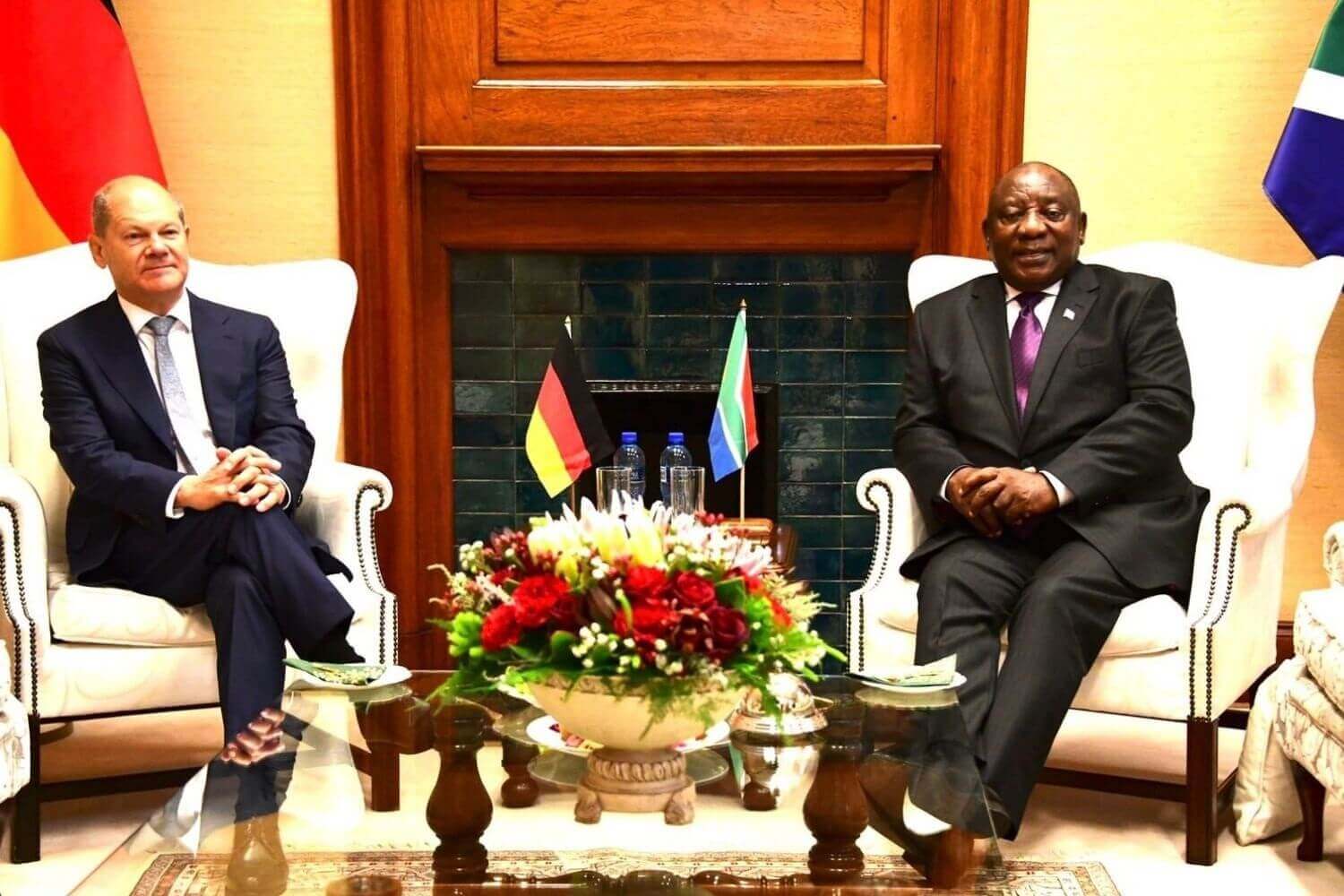South African President Cyril Ramaphosa pushed back against Western pressure to adopt a stronger stance against Russia during his meeting with German Chancellor Olaf Scholz on Tuesday, insisting that he will maintain a neutral position in the Ukraine war.
He stressed, “We are where we are as a nation, as a country, as a result of dialogue, negotiations and collaboration between belligerent entities. We were pitted against each other in the apartheid regime, but it was only through negotiations that brought an end to the conflict.”
President Ramaphosa expressed concern over unilateral sanctions imposed against Russia, stating that even countries that are “either bystanders or not part of the conflict” are likely to suffer because of the measures.
Chancellor Scholz and I discussed a whole range of issues including Russia and the Ukraine. I indicated that as South Africa we would like the conflict between to come to an end and that we call for a cessation of hostilities, which must be done through negotiations and dialogue. pic.twitter.com/CzydBKBJDj
— Cyril Ramaphosa 🇿🇦 (@CyrilRamaphosa) May 24, 2022
Scholz, meanwhile, said he “understands very much” South Africa’s position and noted that the pair had agreed that “there must not be a violent new delineation of borders.”
In this regard, the two leaders called on the “international community to encourage dialogue and negotiation towards a ceasefire and a peaceful negotiation or resolution.”
South Africa has abstained from two key United Nations (UN) resolutions on Russia: one in March to condemn its invasion of Ukraine and call for a withdrawal of its forces and a second in April to expel it from the UN Human Rights Council.
The Russian aggression against Ukraine has to stop. A lot of countries are suffering from this brutal war. We are very decided that we will help the countries that are suffering through global cooperation and by supporting the @WFP – my interview with @DeutscheWelle. https://t.co/0UzHtjZQxa
— Bundeskanzler Olaf Scholz (@Bundeskanzler) May 24, 2022
Back in March, just days after Russia invaded Ukraine, South African International Relations and Cooperation Minister Naledi Pandor called on Russia to withdraw its troops and respect Ukraine’s sovereignty and territorial integrity. However, just a day later, Ramaphosa withdrew the comments and instead said United States (US) President Joe Biden is to blame.
Much of Ramaphosa and Scholz’s discussion focussed on energy ties, however. Germany is planning to increase coal imports from South Africa as it seeks to become totally independent of Russian energy by the end of the year.
At the same time, however, Germany has also previously given South Africa around $8.5 billion to help it reduce its reliance on coal-powered electricity. It also joined South Africa in signing the Just Transition Partnership with France, the United Kingdom, the US, and the European Union last year.
WATCH: His Excellency President @CyrilRamaphosa and HE Chancellor Olaf Scholz at the CARE-O-SENE Project Launch at the Sasol Headquarters in Sandton, Johannesburg. The South African-German collaboration advances technology research for the production of sustainable aviation fuels pic.twitter.com/JZJ2bz8S7z
— Presidency | South Africa 🇿🇦 (@PresidencyZA) May 24, 2022
South Africa has been battling frequent nationwide power cuts over the last month, as its coal-based power stations are struggling to produce sufficient electricity. Keeping this in mind, Germany is helping the country transition towards alternative sources of energy to more effectively meet its demands.
As part of Germany’s effort to help South Africa transition to a green economy, the two leaders launched the Catalyst Research for Sustainable Kerosene (CARE-OSENE) project to jointly produce green hydrogen-based jet fuel. South African Chemical firm Sasol will be partnering with Deutsche Gessellschaft für Internationale Zusammenarbeit (GIZ) in this venture.
Sasol has also been involved in a project in Boegoebaai to harness the country’s wind and solar resources to produce green hydrogen, with a potential to export 10 million tonnes annually by 2030 to the European Union.
We welcome Germany’s announcement at the second Global COVID-19 Summit earlier this month that it will donate EUR 850 million to assist poorer countries to increase their vaccination rates, and EUR 50 million to the pandemic preparedness fund.https://t.co/qHys5QiAvS
— Cyril Ramaphosa 🇿🇦 (@CyrilRamaphosa) May 24, 2022
President Ramaphosa highlighted that he views Germany as a valued economic partner as the country hopes to rebuild, reindustrialise, and recover from the COVID pandemic and recurrent flooding in the KwaZulu-Natal province.
The South African leader also urged Scholz to help ensure that vaccines produced in South Africa by Aspen Pharmacare Holdings—under a licence from Johnson & Johnson—receive an improved global market share, remarking that “there are no buyers for vaccines produced in Africa.”
He told the German Chancellor that the issue should be of concern to him as Germany had been “at the forefront” for enabling Africans to produce COVID vaccines locally.
South Africa is a key country for the continent’s political and economic stability. A big thanks to @CyrilRamaphosa that South Africa is attending the #G7 Summit. Energy prices, the economy and food security are coming under pressure owing to Putin’s war of aggression. #G7GER
— Bundeskanzler Olaf Scholz (@Bundeskanzler) May 24, 2022
According to a press release by the South African presidency, the two leaders also discussed opportunities to increase the presence and investment of German companies in South Africa but also of South African companies in Germany.
The release noted that Germany is South Africa’s second-largest trading partner, describing it as a ‘major’ investor and source of tourism revenue. The two countries have also collaborated in efforts to promote and strengthen democracy, eradicate and tackle HIV, and facilitate climate action.
Scholz has also made overtures to increase diplomatic engagements with South Africa and has invited Ramaphosa to attend the G7 summit in Germany next month, following trips to Senegal and Niger.

